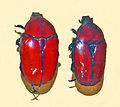
The red-backed shrike is a carnivorous passerine bird and member of the shrike family Laniidae. Its breeding range stretches from Western Europe east to central Russia. It is migratory and winters in the eastern areas of tropical Africa and southern Africa.
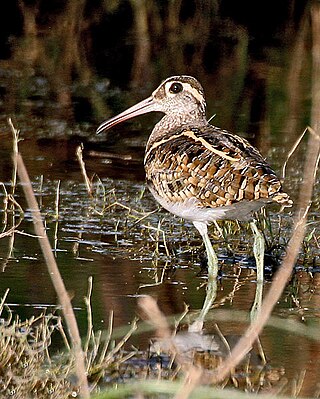
The greater painted-snipe is a species of wader in the family Rostratulidae. It is found in marshes in Africa, South Asia and South-east Asia.
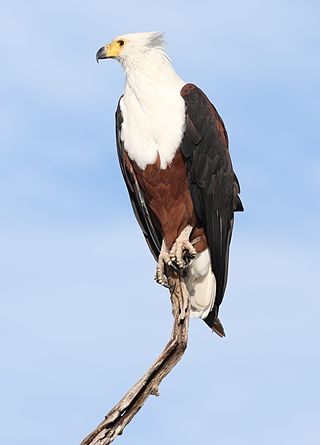
The African fish eagle or the African sea eagle, is a large species of eagle found throughout sub-Saharan Africa wherever large bodies of open water with an abundant food supply occur. It is the national bird of Malawi, Namibia, Zambia, and Zimbabwe. As a result of its large range, it is known in many languages. Examples of names include: Vis Arend in Afrikaans, nkwazi in Chewa, aigle pêcheur in French, hungwe in Shona, inkwazi in isiZulu, and ntšhu in Northern Sotho. This species may resemble the bald eagle in appearance; though related, the two species occurs on different continents, with the bald eagle being resident in North America.

The bushpig is a member of the pig family that inhabits forests, woodland, riverine vegetation and cultivated areas in East and Southern Africa. Probably introduced populations are also present in Madagascar. There have also been unverified reports of their presence on the Comoro island of Mayotte. Bushpigs are mainly nocturnal. There are several subspecies.

The red forest duiker, Natal duiker, or Natal red duiker is a small antelope found in central to southern Africa. It is one of 22 extant species form the subfamily Cephalophinae. While the red forest duiker is very similar to the common duiker, it is smaller in size and has a distinguishing reddish coloring. Additionally, the red forest duiker favors a denser bush habitat than the common duiker. The Natal red duiker is more diurnal and less secretive than most forest duikers, so therefore it is easier for them to be observed. In 1999, red forest duikers had an estimated wild population of 42,000 individuals.

The grey kestrel is an African bird of prey belonging to the falcon family Falconidae. Its closest relatives are the banded kestrel and Dickinson's kestrel and the three are sometimes placed in the subgenus Dissodectes.
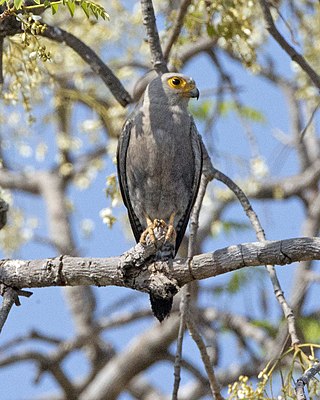
Dickinson's kestrel is a bird of prey of southern and eastern Africa belonging to the falcon family Falconidae. It is named after John Dickinson, an English physician and missionary who collected the type specimen. It is also known as the white-rumped kestrel. Its closest relatives are the grey kestrel and banded kestrel and the three are sometimes placed in the subgenus Dissodectes.

The austral parakeet, austral conure, or emerald parakeet is a species of bird in subfamily Arinae of the family Psittacidae, the African and New World parrots. It is found in Argentina, Chile, and possibly the Falkland Islands.
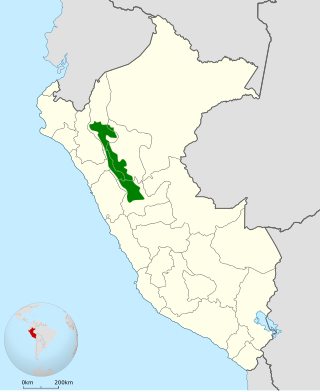
The coppery metaltail is a species of hummingbird in the "coquettes", tribe Lesbiini of subfamily Lesbiinae. It is endemic to Peru.
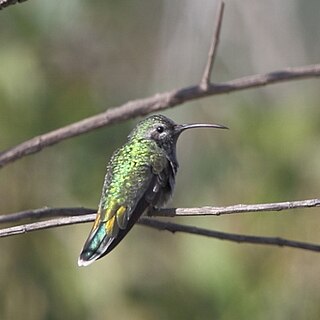
The white-tailed goldenthroat is a species of hummingbird in the subfamily Polytminae, the mangoes. It is found in Argentina, Bolivia, Brazil, Colombia, French Guiana, Guyana, Paraguay, Peru, Suriname, Trinidad and Tobago, and Venezuela.

The akun eagle-owl is a species of owl in the family Strigidae, native to the African tropical rainforest.

The chocolate-backed kingfisher is a species of kingfisher in the subfamily Halcyoninae which occurs in western Sub-Saharan Africa.

The red-billed buffalo weaver is a species of bird in the family Ploceidae. It is found in eastern and southern Africa. Its natural habitat is the dry savanna.

The swamp musk shrew, or musk shrew, is a species of mammal in the family Soricidae. It occurs in Angola, Botswana, Democratic Republic of the Congo, Mozambique, Namibia, South Africa, Eswatini, Zambia and Zimbabwe. Its natural habitat is swamps, and it is a common species in suitable habitats, with the International Union for Conservation of Nature listing it as being of "least concern".

Milax gagates, known by the common name greenhouse slug, is a species of air-breathing, keeled, land slug, a shell-less terrestrial gastropod mollusc in the family Milacidae.

Scopula rubiginata, the tawny wave, is a moth of the family Geometridae. The species was first described by Johann Siegfried Hufnagel in 1767.

Andriasa contraria is a moth of the family Sphingidae. It is known from tropical Africa, including Kenya, Cameroon and South Africa. It is a very variable species and is common in all habitats except deserts and high mountains.

Oraesia emarginata is a species of moth of the family Erebidae first described by Johan Christian Fabricius in 1794. It is found in Australia, New Caledonia, Indonesia, New Guinea, Pakistan, the Philippines, India, Sri Lanka, Sulawesi, Taiwan, China, Japan, Korea and Nepal as well as Eritrea, Ethiopia, Kenya, Namibia, Nigeria, South Africa, Tanzania, the Gambia, Uganda, Oman and Yemen.
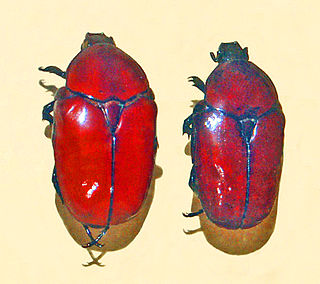
Diplognatha is a genus of beetle belonging to the family Scarabaeidae, Cetoniinae subfamily.

Cephalopholis sonnerati, known as the tomato hind, tomato rockcod, or tomato cod, is a species of marine ray-finned fish, a grouper from the subfamily Epinephelinae which is in the family Serranidae which also includes the anthias and sea basses. It is distributed on coral reefs in the tropical Indo-Pacific. It is also sometimes called the orange-spotted cod, red coral cod, red rockcod, tomato grouper, or tomato seabass.


